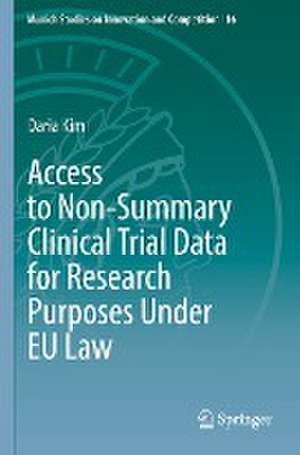Access to Non-Summary Clinical Trial Data for Research Purposes Under EU Law: Munich Studies on Innovation and Competition, cartea 16
Autor Daria Kimen Limba Engleză Paperback – 21 oct 2022
| Toate formatele și edițiile | Preț | Express |
|---|---|---|
| Paperback (1) | 782.24 lei 6-8 săpt. | |
| Springer International Publishing – 21 oct 2022 | 782.24 lei 6-8 săpt. | |
| Hardback (1) | 788.41 lei 6-8 săpt. | |
| Springer International Publishing – 20 oct 2021 | 788.41 lei 6-8 săpt. |
Din seria Munich Studies on Innovation and Competition
- 15%
 Preț: 644.63 lei
Preț: 644.63 lei - 15%
 Preț: 587.20 lei
Preț: 587.20 lei - 15%
 Preț: 528.30 lei
Preț: 528.30 lei - 18%
 Preț: 952.09 lei
Preț: 952.09 lei - 15%
 Preț: 654.43 lei
Preț: 654.43 lei - 18%
 Preț: 724.63 lei
Preț: 724.63 lei - 18%
 Preț: 1007.49 lei
Preț: 1007.49 lei - 18%
 Preț: 894.65 lei
Preț: 894.65 lei - 18%
 Preț: 786.04 lei
Preț: 786.04 lei - 24%
 Preț: 828.05 lei
Preț: 828.05 lei - 15%
 Preț: 652.64 lei
Preț: 652.64 lei -
 Preț: 430.97 lei
Preț: 430.97 lei - 15%
 Preț: 655.78 lei
Preț: 655.78 lei - 15%
 Preț: 645.47 lei
Preț: 645.47 lei - 20%
 Preț: 576.88 lei
Preț: 576.88 lei - 15%
 Preț: 652.49 lei
Preț: 652.49 lei - 18%
 Preț: 729.23 lei
Preț: 729.23 lei - 18%
 Preț: 962.18 lei
Preț: 962.18 lei - 18%
 Preț: 794.39 lei
Preț: 794.39 lei
Preț: 782.24 lei
Preț vechi: 953.96 lei
-18% Nou
Puncte Express: 1173
Preț estimativ în valută:
149.69€ • 157.40$ • 123.68£
149.69€ • 157.40$ • 123.68£
Carte tipărită la comandă
Livrare economică 17 aprilie-01 mai
Preluare comenzi: 021 569.72.76
Specificații
ISBN-13: 9783030867805
ISBN-10: 3030867803
Pagini: 300
Ilustrații: XVIII, 300 p. 5 illus.
Dimensiuni: 155 x 235 mm
Greutate: 0.45 kg
Ediția:1st ed. 2021
Editura: Springer International Publishing
Colecția Springer
Seria Munich Studies on Innovation and Competition
Locul publicării:Cham, Switzerland
ISBN-10: 3030867803
Pagini: 300
Ilustrații: XVIII, 300 p. 5 illus.
Dimensiuni: 155 x 235 mm
Greutate: 0.45 kg
Ediția:1st ed. 2021
Editura: Springer International Publishing
Colecția Springer
Seria Munich Studies on Innovation and Competition
Locul publicării:Cham, Switzerland
Cuprins
PART ONE: Setting the Scene.- Introduction.- The Context and the Problem in Focus.- Secondary Analysis of Clinical Trial Data - A Primer.- PART TWO: Analysis de lege lata,- Legal Sources of Control over and Access to Clinical Trial Data under the EU Applicable Framework.- Implications of IPD Disclosure for Statutory Innovation Incentives PART THREE: Analysis de lege ferenda.- Defining the Intervention Logic of Access-To-Data Measures - A Problem Analysis.- Access to Clinical Trial Data as a Case on R&D Externalities - A Theoretical Framework.- IPD as a Research Resource - Exclusively Controlled or Readily Accessible?.- Evaluating Legislative Options.- Final Conclusions and the Outlook.
Notă biografică
Daria Kim is senior research fellow at the Max Planck Institute for Competition and Innovation (Munich), where she works on the topics related to the regulation of the data economy and life sciences. Prior to joining Max Planck Institute, she worked as a research associate at the Chinese University of Hong Kong. She holds MA (Indiana University of Pennsylvania), LLM (Munich Intellectual Property Law Center) and Dr. iur. (the University of Augsburg) degrees.
Textul de pe ultima copertă
This book draws a unique perspective on the regulation of access to clinical trial data as a case on research and knowledge externalities. Notwithstanding numerous potential benefits for medical research and public health, many jurisdictions have struggled to ensure access to clinical trial data, even at the level of the trial results. Pro-access policy initiatives have been strongly opposed by research-based drug companies arguing that mandatory data disclosure impedes their innovation incentives. Conventionally, access to test data has been approached from the perspective of transparency and research ethics. The book offers a complementary view and considers access to individual patient-level trial data for exploratory analysis as a matter of research and innovation policy. Such approach appears to be especially relevant in the data-driven economy where digital data constitutes a valuable economic resource. The study seeks to define how the rules of access to clinical trialdata should be designed to reconcile the policy objectives of leveraging the research potential of data through secondary analysis, on the one hand, and protecting economic incentives of research-based drug companies, on the other hand. Overall, it is argued that the mainstream innovation-based justification for exclusive control over the outcomes of research and development can hardly rationalise trial sponsors’ control over primary data from trials. Instead, access to such data and its robust analysis should be prioritised.
Caracteristici
Provides a unique perspective on the regulation of access to clinical trial data as a case on knowledge externalities Reveals limitations and inconsistencies of the current regulatory approach to access to clinical trial data Proposes a legislative solution of how access to non-summary clinical trial data can be integrated
